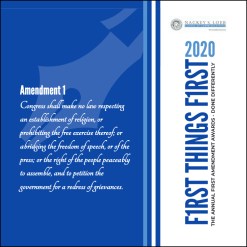This essay originally appeared in F1rst Things F1rst, a publication by the Nackey S. Loeb School of Communications. Click here to learn more.
By Justin Silverman
 About 50 years ago a Chicago attorney received a phone call from a man being prevented from demonstrating in a small town northwest of the city. Town officials, the caller said, didn’t like the message they anticipated him sharing and didn’t want him to speak.
About 50 years ago a Chicago attorney received a phone call from a man being prevented from demonstrating in a small town northwest of the city. Town officials, the caller said, didn’t like the message they anticipated him sharing and didn’t want him to speak.
Recognizing the clear constitutional interests at stake when government decides which voices should be heard and which ones silenced, the attorney agreed to represent the caller. The case that proceeded would eventually become First Amendment legend, but the principles on which this attorney stood now seem to be forgotten.
The caller’s name was Frank Collin, a Nazi leader of the National Socialist Party of America. Collin and his fellow party members wanted to parade through the predominately Jewish town of Skokie, Illinois, wearing Nazi uniforms and displaying swastikas.
The attorney who agreed to represent him was David Goldberger, a Jewish lawyer then working for the ACLU of Illinois. He would serve as lead and prevailing counsel in the 1977 U.S. Supreme Court case National Socialist Party of America v. Village of Skokie.
Goldberger, who remembers being attacked repeatedly at the time as a “traitorous Jew,” recently wrote: “To this day, the case still brings up difficult feelings about representing a client whose constitutional rights were being violated but who represented the hatred and bigotry that continues to erupt into America’s consciousness.”
As Goldberger’s story attests, the First Amendment is both a blessing and a burden. Only by requiring government to remain steadfastly neutral can the First Amendment protect minority voices and dissenting opinions — key components of our democracy — from censorship through changes in power.
Depending on perspective, unpopular expression may be a red “Make America Great Again” hat in a public school or a Black Lives Matter sign staked into a front lawn. To protect one voice, the First Amendment must protect the other no matter how objectionable it may be.
In today’s political environment, unfortunately, tolerance for even mere disagreement can seem like a burden too great to bear. The wisdom of the First Amendment has become overshadowed by what U.S. Supreme Court Justice Oliver Wendell Holmes, Jr., called “freedom for the thought that we hate.”
A survey released last year by the Freedom Forum Institute found nearly one-third of Americans believe First Amendment freedoms “go too far,” and nearly one-half believe public institutions should revoke invitations to guest speakers when they are likely to offend.
When it comes to the First Amendment, our focus as a country seems to be on other people’s speech and its effect on us. We would be better served to also view the First Amendment through a self-centered lens. Rather than focusing solely on the speech of others, we should consider that it is our own speech that may need protection in the future. Whether speech is offensive, ultimately, is a matter of shifting opinion.
Prior to Skokie, courts across the country were already ruling in favor of protestors who challenged parade ordinances. According to one legal scholar, “the ordinances vested too much power in city officials who could — and sometimes would — deny permits because they disliked the group or its cause.” But these cases were different than Skokie. They occurred in the South during the Civil Rights Era and those silenced were Blacks marching against racism.
Silencing some speech, even under the best of intentions, can endanger all speech. In his recent essay, Goldberger wrote that a state legislator after the Skokie case introduced a bill that sought to criminalize the “public display of racial hatred.” The proposed law, Goldberger explained, “used language so sweeping that it would justify, for example, criminal prosecution of a Black Lives Matter leader for making a speech blaming white racism for police shootings of African Americans.”
Lawmakers carving out offensive speech from First Amendment protection will never use a sharp enough scalpel. As the framers of our Constitution knew, government is ill-equipped to determine for us what discourse is appropriate. Give government the power to make such a determination and that power will inevitably be abused.
This applies not only to freedom of speech, but also to freedoms of religion, press and assembly as well as the corollary right to obtain government information. True, the First Amendment may protect expression we personally find offensive, but we must remember that this figurative shield is there for our protection too. One day we may find ourselves in the political minority, expressing unpopular opinions and with government officials pointing their collective finger at us.
Justin Silverman is executive director of the New England First Amendment Coalition.
NEFAC was formed in 2006 to advance and protect the Five Freedoms of the First Amendment, including the principle of the public’s right to know. We’re a broad-based organization of people who believe in the power of an informed democratic society. Our members include lawyers, journalists, historians, academics and private citizens.
Our coalition is funded through contributions made by those who value the First Amendment and who strive to keep government accountable. Please make a donation here.
Major Supporters of NEFAC include Hearst Connecticut Media Group, The Boston Globe, Paul and Ann Sagan, WBUR, Boston University and the Robertson Foundation.
